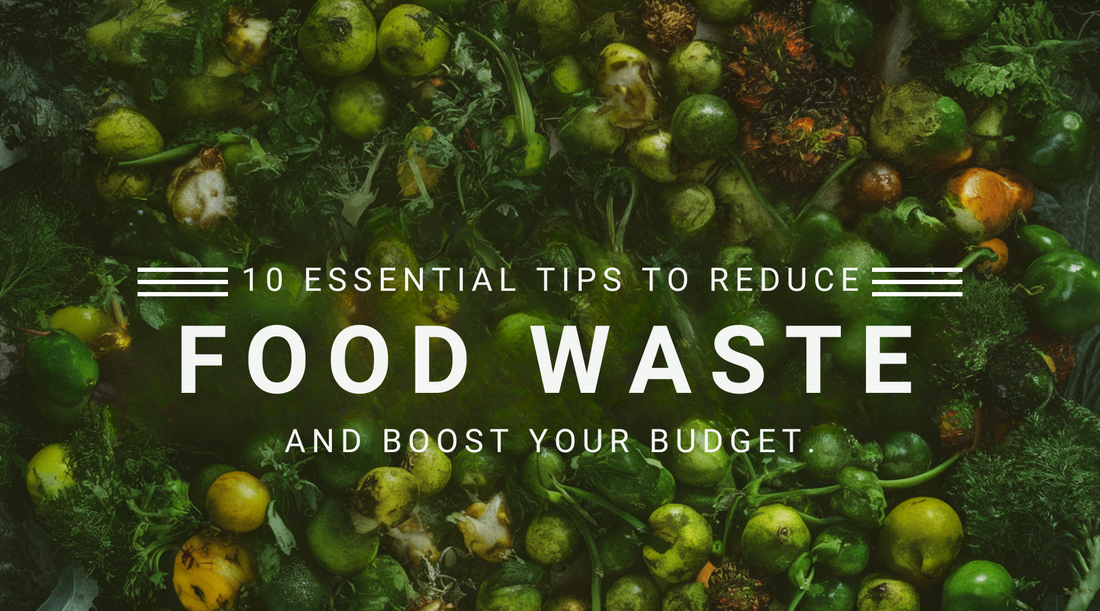10 Essential Tips to Reduce Food Waste and Boost Your Budget

Food waste is a global issue that not only affects our environment but also impacts our wallets. By implementing simple yet effective strategies, we can reduce food waste and save money while leading a more sustainable lifestyle. In this blog, we will share the ten essential tips to minimise food waste and boost your budget. Read on to find out how these practical tips will empower you to make conscious choices in the kitchen and reduce your impact on the planet.
1. Plan Your Meals
Meal planning is a crucial step in reducing food waste. Take some time each week to plan your meals. Consider the ingredients you already have and create a shopping list for the items you need. By planning your meals, you can avoid impulse purchases and ensure that you only buy what you will use. This helps to minimise food waste and save money by eliminating unnecessary items from your shopping cart.
Also Read: A Complete Analysis for Seafood Protein vs. Animal Protein
2. Buy Wisely
When shopping for groceries, be mindful of what you buy. Only purchase what you need, and avoid buying in bulk unless you know you will use the items before they expire. Buying smaller quantities of perishable items ensures that you can consume them before they spoil. Also, consider the shelf life of products and choose items with longer expiration dates. This will help reduce the chances of food going to waste and allow you to maximise your budget.
3. Store Food Properly
Proper food storage is essential in preventing food waste. Invest in quality glass food storage containers, from reputable brands such as Houszy, to extend the shelf life of your ingredients. These glass containers provide an airtight seal, keeping your food fresh for longer periods. Also, make sure to store perishable items in the refrigerator at the recommended temperature. Proper storage prevents food spoilage and helps you use your groceries before they go bad, saving you money and reducing waste.
Also Read: Introducing The Houszy Glass Meal Prep Container Set Range
4. Practice First-In, First-Out
When organising your pantry and refrigerator, adopt the first-in, first-out (FIFO) method. This means using older products before opening newer ones. By prioritising items that are closer to their expiration dates, you ensure that nothing goes to waste. Glass food storage containers can help with FIFO by providing clear visibility of the contents, allowing you to easily identify what needs to be used first. Implementing this method in your kitchen routine will help reduce food waste and stretch your budget.
5. Get Creative with Leftovers
Leftovers can be transformed into delicious new meals. Instead of letting them go to waste, get creative and repurpose them. Use non-stick cookware, to recreate leftovers into exciting dishes. Leftover roasted vegetables can be turned into a flavourful stir-fry, and cooked meats can be added to salads or sandwiches. By using your leftovers, you not only minimise waste but also save money by avoiding the need to purchase additional ingredients.
6. Portion Control
Controlling portion sizes is an effective way to reduce food waste. Serve yourself and your family with appropriate portions to avoid excess leftovers. Non-stick frying pans and pots and pans sets, come in various sizes, allowing you to cook meals that suit your needs. By cooking the right amount, you can prevent food from being wasted and save money by not overbuying groceries.
7. Understand Expiration Dates
Understanding expiration dates is essential in reducing food waste. Familiarise yourself with the different types of expiration dates, such as "best before" and "use by." These dates indicate the quality and safety of the product. Trust your senses to determine if the food is still suitable for consumption. Glass food storage containers can help you keep track of expiration dates and prevent food from being forgotten and wasted in the back of your pantry or refrigerator.
8. Save and Use Food Scraps
Food scraps can be repurposed and used in various ways. Vegetable scraps, for example, can be used to make homemade vegetable broth, while fruit peels can be turned into tasty snacks or infused water. Get creative with your food scraps and explore recipes or DIY projects that can use them. By finding ways to use food scraps, you reduce waste, save money, and make the most out of your groceries.
9. Donate Excess Food
If you find yourself with excess food that you will not be able to consume, consider donating it to local food banks or charities. Many organisations accept non-perishable items and fresh produce. Donating food not only prevents waste but also helps those in need. Research local food donation programs in your area to find out how you can contribute. By donating, you make a positive impact on your community while reducing food waste.
Also Read: Top 10 Sources of Animal-Based Protein vs. Plant-Based Protein Options
10. Track Your Progress and Celebrate Success
Tracking your progress is crucial in maintaining motivation and accountability. Keep a record of the food you save and the money you save by reducing waste. Celebrate your achievements and set new goals for further waste reduction. By being mindful of your efforts, you can continue to improve and make a significant impact on reducing food waste and boosting your budget.
The Final Word
Reducing food waste is a collective effort that starts with individual actions. Consider implementing the aforementioned essential tips to significantly reduce waste and save money. Also, use Houszy's kitchen products, such as glass food storage containers, frying pans, pots and pans sets, grill pans, and deep-frying pans, to assist you in your waste reduction journey. By adopting these practices, you can minimise food waste and contribute to a more sustainable future while boosting your budget.









